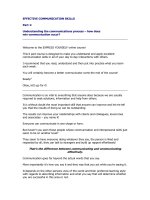Communication skills handout
Bạn đang xem bản rút gọn của tài liệu. Xem và tải ngay bản đầy đủ của tài liệu tại đây (382.45 KB, 54 trang )
COMMUNICATION
SKILLS- CCS 001
UNIVERSITY OF NAIROBI
8-4-4 BUILDING ( 1st Flr RM 4
Dr. Omollo- Odhiambo
THIS LECTURE IS ABOUT
TO BEGIN .
IF YOU ARE IN POSSESSION OF A
CELL PHONE, KINDLY TURN IT OFF
NOW !
Who am I…?
Dr D. Omollo- Odhiambo ( BED, M ED, Phd Health
Communication- School of Journalism and Mass
Commmunication
• Lecturer, UON
• Dept of Communication Skills and Studies
Dorothy.omollo @uonbi.ac.ke
AIM of COMM. Skills
Unit
• Aim is to equip students with
communication skills suitable for
academic and career purposes: impart
knowledge, attitudes and skills for
University academic pursuit.
OBJECTIVES
• By the end of the course, students
should be able to:
- Communicate effectively for
academic purposes.
- Apply requisite comm-skills.
-Demonstrate understanding of
generic fundamentals of
communication.
Course schedule
• CCS-001- 4 SKILL AREAS
• Begins with Introduction to
Academic Communication Skills
• Academic Writing Skills, Academic
Reading Skills, Public speaking and
oral presentation skills, Functional
writing skills,
Course Evaluation
• CATS in each given skill area
• Final summative examination for two hours in all
skills taught
• Class participation and expectation that each
student will have to exhibit mastery and
knowledge of each communication skill area.
• Contact hours is 45 hrs including two hrs exam
• COURSE will be taught through Lectures, Group
discussions and individual student presentations
Recommended
Readings/Books
Afoloyan, A & Newsum, H.E ( I986)
The Use of English Commmunication
Skills for University Students.
London: Longman
Comprehensive reading list in the
Course outline
Importance of
Communication
• Comm-skills not just handy; they are
critical tools for success
• Important for survival in real world
environment,
• Critical for propagation of kldge and
development; Managing change/
conflicts effectively,
Importance of
Communication
• Comm-skills are the building blocks
of academic life and career,
• Comm-skills occupies central position
in a students’ life and that of
practicing professional;
• Basic skills for survival at university,
higher learning.
Importance of
Communication
• Useful in training of professionals
and acquisition of:
-Cognitive skills
- Psychomotor-(Technical) skills
-Social –( Comm. skills)
All professionals need more than
specialized kldge
Introduction
• What is communication?
In simple words we can say that
““just to convey the message”
If we go in more detail we can say that
“ communication is the process of
transmitting (A
B) & Receiving
(B
A) Messages.
Communication Defined
• Theodorson ( 1969): Defines comm. as the
transmission of information , ideas, attitudes, or
emotions from one person or group to another or
others primarily through symbols
• Osgood et al. (1957) There is communication
wherever one system or source influences
another, by manipulation of alternative symbols
transmitted over the channel
Communication Defined
• Gerber ( 1957) defines communication as social
interaction through messages.
• Comprehensive: Communication is the process of
transmitting information and messages from one
point to another for the purpose of eliciting
action actions that will accomplish a specific goal
. Communication is done with the intention of
influencing an audience
• As a process, communication is not discrete,
static or solitary. It exists in time and changes
constantly
Organizational Comm.
• Process by which info is passed
between individuals, groups or depts
and externally to customers, clients,
suppliers, and other stakeholders by
means of previously agreed symbols
for purposes of eliciting appropriate
action to enhance orgs image,
efficiency and effectiveness.
Effective Communication:• If some one achieve the desired
level of objective through
communication , we can say that it is
“effective communication”.
e.g. If your communication get the
proper response from the receiver it
means that you effectively conveyed
the message.
How to achieve effective
Communication
Encourage creative and Critical Thinking
Consider audience’s information needs
Consider Audience's Technical Background
Consider Audience's Cultural Background and
Gender
Consider Audience's Knowledge of the
Subject
What is effective communication?
Consider the possibility of
Communication Failure
Expect audience resistance
Recognize communication constraints
Legal, social economic,
psychological, institutional,cultural etc
Using gender-neutral terms for occupations, positions, roles,
Terms that specify a particular gender can unnecessarily
effect certain stereotypes when used generically.
Avoid This Use
Use This Instead
businessman
businessperson, executive, manager, business owner, chair,
chairperson
firefighter
homemaker
layperson, no specialist, nonprofessional
mail or letter carrier
police officer or law enforcement officer
salesperson, sales representative, sales associate,
fireman
housewife
layman
postman
policeman
salesman, saleswoman,
salesgirl
spokesman
workman
spokesperson,
worker
Components of Communication
1. Context
–
–
2.
3.
4.
5.
6.
Internal Means
External Means
Sender (Encoder)
Message
Medium
Receiver (Decoder)
Feed Back
Context
•
Context tells us reason for
communication and reasons may be
1. Internal
2. External









